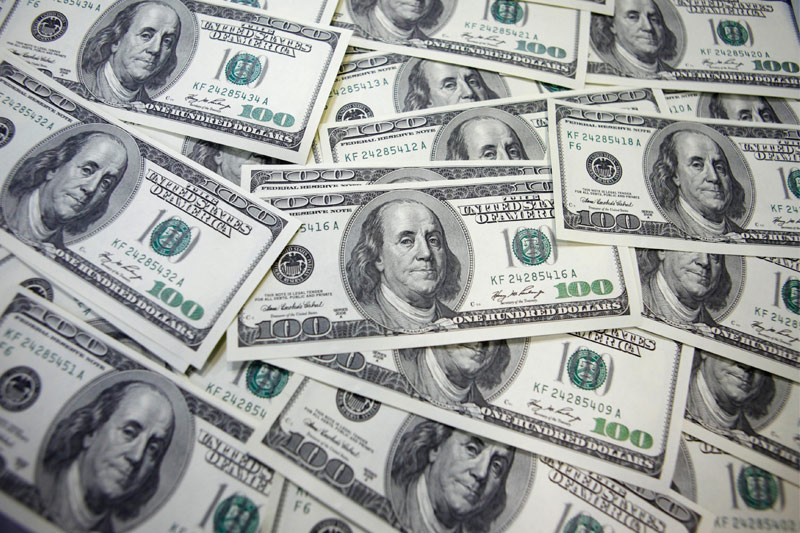Investing.com - The U.S. dollar was mixed against the other major currencies in choppy trade on Wednesday, following media reports that the European Central Bank is planning unlimited purchases of short-term government bonds in order to ease the debt crisis in the region.
During U.S. morning trade, the dollar was lower against the euro, with EUR/USD up 0.20% to 1.2592.
The euro strengthened broadly after Bloomberg reported that the ECB is planning "unlimited, sterilized" bond buying, without setting bond yield targets. The plan is reported to be focused on government bonds with maturities of up to three years.
The ECB declined to comment on the report.
Demand for the euro has been underpinned in recent weeks by expectations that the ECB is set to announce more details of measures to help stabilize the region’s sovereign debt markets after its policy meeting on Thursday.
The single currency came under pressure earlier in the session, after a report showing that service sector activity in the euro zone contracted at a slightly faster rate than initially estimated in August added to fears that the bloc is set to enter a technical recession in the third quarter.
A separate report showed that retail sales in the single currency bloc fell 0.2% in July, in line with expectations, bringing the annualized rate of decline to 1.7%.
The greenback was also down against the pound, with GBP/USD rising 0.21% to 1.5903.
The pound remained supported after stronger-than-forecast service sector data for August fuelled hopes that the Bank of England would refrain from implementing further stimulus measures at its policy meeting on Thursday.
Elsewhere, the greenback was little changed against the yen and the Swiss franc, with USD/JPY dipping 0.09% to 78.35 and USD/CHF inching up 0.05% to 0.9562.
The Swiss franc was little changed after official data showed that consumer price inflation in Switzerland was flat in August, compared to expectations for a 0.1% increase.
The greenback was higher against its Canadian, Australian and New Zealand counterparts, with USD/CAD up 0.49% to 0.9906, AUD/USD losing 0.39% to trade at 1.0185 and NZD/USD dipping 0.06% to 0.7938.
The Bank of Canada kept its benchmark interest rate unchanged at 1.00% earlier, in line with market expectations.
The central bank repeated the language of its two previous rate statements, saying “some modest withdrawal of the present considerable monetary policy stimulus may become appropriate.”
The dollar index, which tracks the performance of the greenback versus a basket of six other major currencies, slid 0.11% to 81.27.
Elsewhere Wednesday, Germany's Finance Minister Wolfgang Schäuble said the euro zone would be more stable in 2013 and added that the bloc would still exist in the same form as it does now.
During U.S. morning trade, the dollar was lower against the euro, with EUR/USD up 0.20% to 1.2592.
The euro strengthened broadly after Bloomberg reported that the ECB is planning "unlimited, sterilized" bond buying, without setting bond yield targets. The plan is reported to be focused on government bonds with maturities of up to three years.
The ECB declined to comment on the report.
Demand for the euro has been underpinned in recent weeks by expectations that the ECB is set to announce more details of measures to help stabilize the region’s sovereign debt markets after its policy meeting on Thursday.
The single currency came under pressure earlier in the session, after a report showing that service sector activity in the euro zone contracted at a slightly faster rate than initially estimated in August added to fears that the bloc is set to enter a technical recession in the third quarter.
A separate report showed that retail sales in the single currency bloc fell 0.2% in July, in line with expectations, bringing the annualized rate of decline to 1.7%.
The greenback was also down against the pound, with GBP/USD rising 0.21% to 1.5903.
The pound remained supported after stronger-than-forecast service sector data for August fuelled hopes that the Bank of England would refrain from implementing further stimulus measures at its policy meeting on Thursday.
Elsewhere, the greenback was little changed against the yen and the Swiss franc, with USD/JPY dipping 0.09% to 78.35 and USD/CHF inching up 0.05% to 0.9562.
The Swiss franc was little changed after official data showed that consumer price inflation in Switzerland was flat in August, compared to expectations for a 0.1% increase.
The greenback was higher against its Canadian, Australian and New Zealand counterparts, with USD/CAD up 0.49% to 0.9906, AUD/USD losing 0.39% to trade at 1.0185 and NZD/USD dipping 0.06% to 0.7938.
The Bank of Canada kept its benchmark interest rate unchanged at 1.00% earlier, in line with market expectations.
The central bank repeated the language of its two previous rate statements, saying “some modest withdrawal of the present considerable monetary policy stimulus may become appropriate.”
The dollar index, which tracks the performance of the greenback versus a basket of six other major currencies, slid 0.11% to 81.27.
Elsewhere Wednesday, Germany's Finance Minister Wolfgang Schäuble said the euro zone would be more stable in 2013 and added that the bloc would still exist in the same form as it does now.
